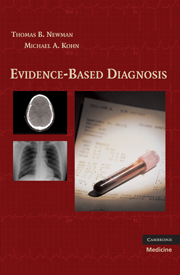Book contents
- Frontmatter
- Contents
- Preface
- Acknowledgments & Dedication
- Abbreviations/Acronyms
- 1 Introduction: understanding diagnosis and diagnostic testing
- 2 Reliability and measurement error
- 3 Dichotomous tests
- 4 Multilevel and continuous tests
- 5 Critical appraisal of studies of diagnostic tests
- 6 Screening tests
- 7 Prognostic tests and studies
- 8 Multiple tests and multivariable decision rules
- 9 Quantifying treatment effects using randomized trials
- 10 Alternatives to randomized trials for estimating treatment effects
- 11 Understanding P-values and confidence intervals
- 12 Challenges for evidence-based diagnosis
- Answers to problems
- Index
- References
1 - Introduction: understanding diagnosis and diagnostic testing
Published online by Cambridge University Press: 04 August 2010
- Frontmatter
- Contents
- Preface
- Acknowledgments & Dedication
- Abbreviations/Acronyms
- 1 Introduction: understanding diagnosis and diagnostic testing
- 2 Reliability and measurement error
- 3 Dichotomous tests
- 4 Multilevel and continuous tests
- 5 Critical appraisal of studies of diagnostic tests
- 6 Screening tests
- 7 Prognostic tests and studies
- 8 Multiple tests and multivariable decision rules
- 9 Quantifying treatment effects using randomized trials
- 10 Alternatives to randomized trials for estimating treatment effects
- 11 Understanding P-values and confidence intervals
- 12 Challenges for evidence-based diagnosis
- Answers to problems
- Index
- References
Summary
Two areas of evidence-based medicine: diagnosis and treatment
The term “evidence-based medicine” (EBM) was coined by Gordon Guyatt and colleagues of McMaster University around 1992 (Evidence-Based Medicine Working Group 1992). Oversimplifying greatly, EBM is about using the best available evidence to help in two related areas:
Diagnosis: How to evaluate a test and then use it to estimate the probability that a patient has a given disease.
Treatment: How to determine whether a treatment is beneficial in patients with a given disease, and if so, whether the benefits outweigh the costs and risks.
The two areas of evidence-based diagnosis and treatment are closely related. Although a diagnosis can be useful for prognosis, epidemiologic tracking, and scientific study, it may not be worth the costs and risks of testing to diagnose a disease that has no effective treatment. Even if an effective treatment exists, there are probabilities of disease so low that it is not worth testing for the disease. These probabilities depend not only on the cost and accuracy of the test, but also on the effectiveness of the treatment. As suggested by the title, this book focuses more intensively on the diagnosis area of EBM.
Information
- Type
- Chapter
- Information
- Evidence-Based Diagnosis , pp. 1 - 9Publisher: Cambridge University PressPrint publication year: 2009
